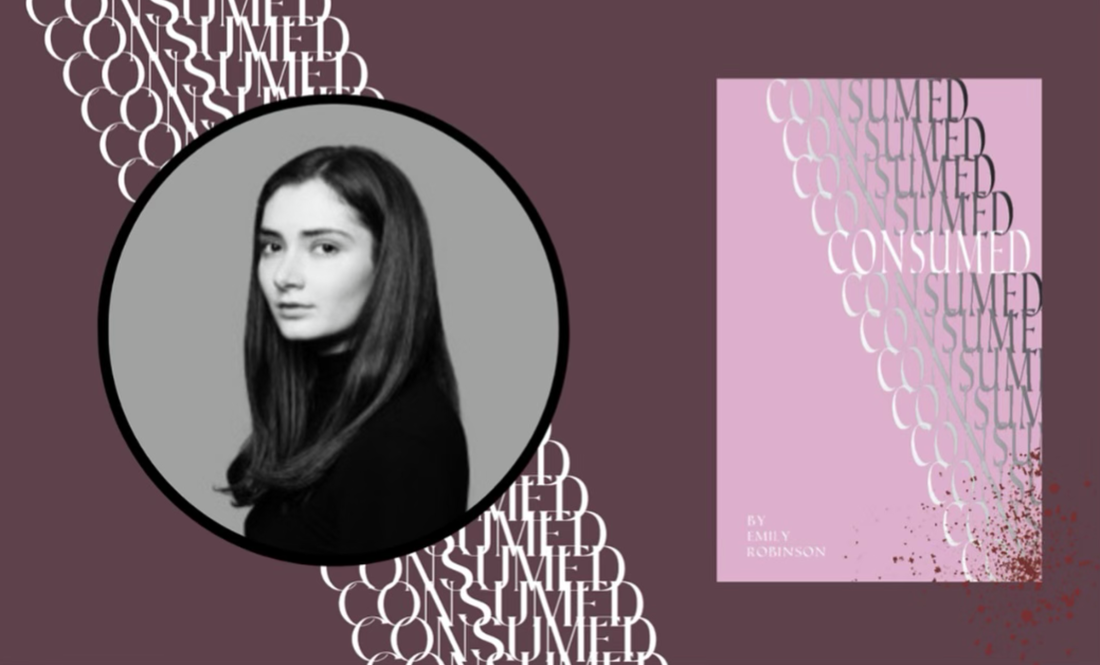|
Ekphrasis magazine was thrilled to sit down with Emily Robinson, writer, director, actor, producer – and Ekphrasis alum. Our discussion, centered around the release of Emily's debut novel, Consumed, touched on everything from daily writing habits to Italian vineyards, to the queerness of body horror as a genre. We invite you to discover Emily's work by picking up a copy of Consumed from Grey Borders.
This is your debut novel, but you’ve been a writer for a long time. How do you feel like your writing has changed over the years, and how would you describe your writing practice? Emily Robinson: My writing practice began as a reading practice, or really, an addiction. I loved books and I idolized the people who dreamt them up. My earliest writing began as a ritual, or a routine attempt to become someone who created the magical thing that I loved: books. I wrote badly and I wrote constantly. Diary entries exclusively about crushes and the secret languages my friends and I schemed up…. In retrospect, it’s strange to say that in high school I first began sharing my writing more publicly. I started writing articles here and there for online publications and developed a short film. I had this raging desire to connect and create, to take the private practice of putting words on the page and bring it into a space I could no longer control: the wider world. Some people have a rigid writing routine: two hours everyday or 1,000 words, no questions asked. I wish I kept such a schedule. Sometimes I manage to for a number of weeks or months, but rarely longer than that. When I’m writing for myself—not for a contract or assignment—I write when I have something to say. When it’s hard to focus, I treat myself to fancy coffee shops to force myself to sit down and get down whatever’s coming up. It comes in waves. Some days, I could write for hours and hours and barely come up for water. Other days, I have to push myself through the hurdle or dive deeper into the blockage. Why am I stuck?? As I’ve begun to write more and more for work, I’ve found it trying at times to retain the creative spark. I’m a fiend for more experimental writing exercises. I love to be pushed outside of my mind, forced to create something within parameters. Sometimes I gift myself writing assignments to push my craft and my brain forward. The results of these writing experiments are private and are not meant to be shared. While writing is about communication, it is also personal. Sometimes the only person with whom you need to communicate is yourself. I try to allow myself that gift when I need inspiration. In short, it ebbs and flows. Every time I write, it feels new again. In Consumed, your protagonist Amber escapes the sweltering heat of a New York City summer for the vineyards of Italy – a trip you yourself have made. How was this novel born of or borne by your travels? Did you find Amber and Natalia, or did they find you? ER: I have always found that I write what I need to read. In high school, I wrote a short film about a girl losing her virginity and questioning her sexuality before I was able to do either myself. Consumed is a much more esoteric approach to this same idea. When the story was conceived, I was dealing with an incredible amount of inner turmoil, and unable to look previous violations of my body in the face. I went to Italy and had barely any access to WiFi, finished the books I brought too quickly, and found myself bored, with nothing to do but think. Thank god I had my computer. I began to write. The structure came quickly. The approach, not as fast. Over the next year or two, I developed the novel in my writing classes at Columbia. I was very fortunate to have generous readers and professors who helped me push the story in the ways it needed to be pushed. I am not a fan of horror for the sake of horror. I really tried my best to avoid writing some of the more gruesome scenes. Through workshopping, it became clear that I needed to go there in order for the story to work. I’m so glad I did, even if there were a few nightmares along the way. Your prose is contemplative, deeply atmospheric, and imbued with a creeping, uneasy sense of dread. How did you go about finding and honing this voice? What inspired the gorgeous viscerality of this novel? ER: The writing process began during the summer after my sophomore year of college. My mind was swirling, overcome with texts on morality, love, desire, overwhelmed by experience, heartbreak, violation and violation and violation. The cadence came from muttering the words aloud as I typed. While the book is written in the third person, it is an extremely close third person. It is an inner monologue. An inner monologue gone wrong. The lyricism emerged organically and felt integral to the story. The reader needs to be lulled into the crumbling world that is Amber’s mind. Let’s talk cannibalism and queerness. What inspired those delicious eating scenes? And do you see these themes as interrelated in this novel? ER: Though cannibalism in literature is by no means a new phenomenon, it is certainly having a moment. To me, it was inevitable that it would become the climax of this book. Consumed, as the name suggests, is about consumption – of content, of food, of people. It deals with incredibly dark themes, and, ironically, the cannibalism is not the darkest. The cannibalism is done out of love, out of preservation. It is the life raft, an attempt to save a person dying from the abuse that is common in our real world. I find it hard to write about without spoiling the novel, but all the relationships in the book are difficult and imperfect. The book is a grasp at healing. Amber flees New York to escape trauma, to move on and forget – but her body is smart, and it will not let her. She is on the verge of collapse when she falls in love. And it is through that love, even if it lacks healthy boundaries, that Amber glimpses her own freedom, even if it’s not enough to save her. That’s the tragedy of the novel. There is love and there is healing, but it is not enough. She needed to save herself, and she couldn’t. It was too much. The queerness of the book exists in the way it does, because it made sense within the context of Amber’s world. That’s likely because, surreal elements aside, the world in which Amber lives is very similar to my own. I’ve lived in New York, traveled to Italy, worked on a vineyard, and I’m queer. The people and places and ideas that I have are certainly informed by that. Stories of healing—whether they end successfully for the protagonist or not—are complicated. It’s hard to write the intricacies of what feels safe and what doesn’t. All I know is there was never a world in which Amber would fall for Luca. Her great love had to be Natalia. Body horror is a heavily cinematic genre, and your background in film clearly informs your prose. Can you talk a bit about your influences, from film, TV, literature, or elsewhere, and how you write with such a clear voice while also paying homage to other artists? ER: There are so many influences. For starters, I’ve never written a book that has talked directly about so many artists and inspiration sources. However, Amber is in college, at a point in her life where everything feels new and big and vital. Her perspective is still emerging, and it feels like a discovery bursting from her body. Once she sees the art of Lucio Fontana and Caravaggio, she sees it everywhere. It was freeing getting to dive deep into her obsessions and inspiration. In my opinion, everything is in conversation with everything else, even if you, as the writer, are not aware of the conversation. To make it distinct, you have to have something to say. You have to have a perspective of your own. In no particular order, some references: Movies: Der Fan, Possession, Swallow, Raw, The Stendhal Syndrome, Spencer, Call Me By Your Name, Crimes of the Future, Portrait of a Lady on Fire, Sick of Myself, etc.. Writers: Carmen Maria Machado, Melissa Broder, William S. Burroughs, Larry Mitchell, Hilary Leichter, Andrea Lawlor, etc.. Musicians: 100 Gecs, Max Richter, Anna Meredith, Dustin O’Halloran, Kim Petras, Soléy, SOPHIE, Angel Olsen, Rina Sawayama, Kate Bush, Johnny Greenwood, etc.. Consuming takes many forms in this book. What are you consumed by now? ER: I’m consumed with so many things! Good coffee, Breath of the Wild, arts and crafts, adult friendships, my exercise box (yes, I’ve written about her for Ekphrasis!), being in love, morning walks, the return of the romcom.
1 Comment
Debbie von Ahrens
11/9/2023 12:00:33 pm
This interview was incredibly insightful. I was particularly moved by Emily's comment "It deals with incredibly dark themes, and, ironically, the cannibalism is not the darkest. The cannibalism is done out of love, out of preservation. It is the life raft, an attempt to save a person dying from the abuse that is common in our real world." So much to digest (excuse the pun.)
Reply
Leave a Reply. |


 RSS Feed
RSS Feed